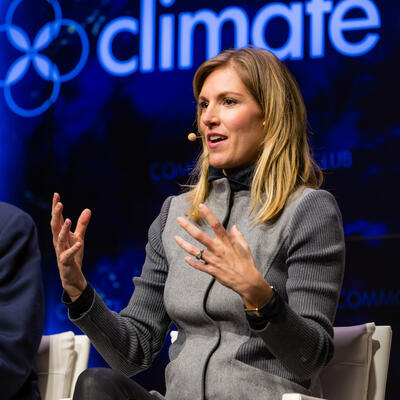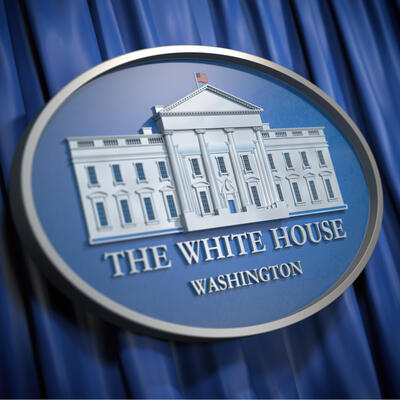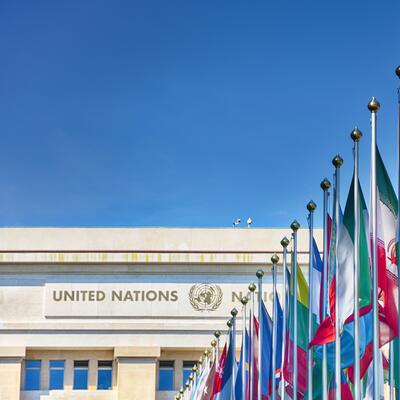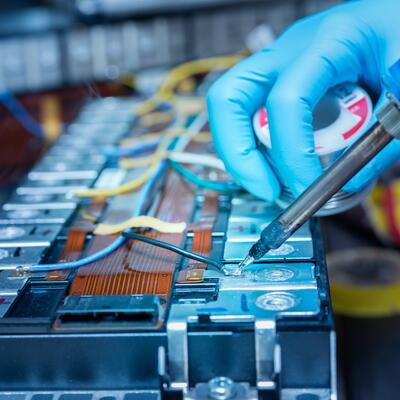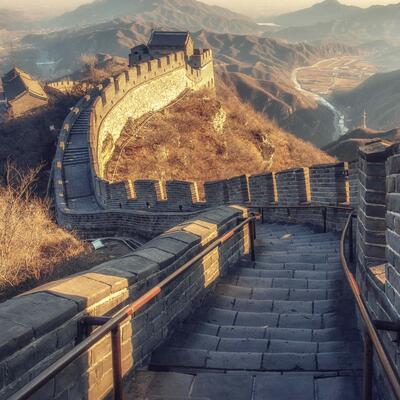
How To Dance With China
Guests

Emily Feng
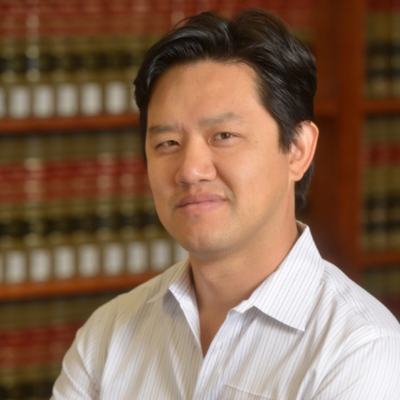
Alex Wang

James Sallee
Summary
In the last two decades, China has made big commitments to renewable energy — and it’s delivered. In 2022, China installed as much solar capacity as the rest of the world combined.
China has also become a giant in the world of electric vehicles. Chinese company BYD recently surpassed Tesla as the world's largest EV maker — with cars at just a fraction of the cost. One of their EVs sells for under $10,000 – a game changer for the global auto industry.
But China is still the world’s largest greenhouse gas emitter. Coal remains its primary source of energy and emissions. So even with all that clean energy capacity, Climate Action Tracker ranks the country’s emission reduction goals as “highly insufficient.”
And all that has people here in the US seriously concerned — China is seen as a threat to our economy, our environment, and our national security. But what to do about any one of these threats is complicated and complex.
Emily Feng, a correspondent for NPR, says China’s rapid ascent into the renewable energy industry can be summed up by one key factor: scale.
“China has created an entire supply chain. Everything is in-house. They have the polysilicon that goes into solar panels. They've got the solar panel makers themselves. They're also their own biggest consumer of solar panels, though they do export a lot of it.”
James Sallee, an economist at UC Berkeley, thinks we need to reframe our relationship with China to make real climate progress quickly.
“The way that both Democrats and Republicans in Washington are talking about China is as an adversary but not as someone that we need to learn from,” he says. “Because we are, in fact, behind on the battery side and on the EV side. And so [leaders in Washington] should be thinking, how do we catch up? What's a good strategy? What's the right way to do that? And instead, we're just building a fence.”
Alex Wang, a law professor at UCLA, says the Chinese investment in green development has really started to pay off in the last five or six years. In his work with the California China Climate Institute, he’s seen examples of U.S.-China collaboration on climate change at subnational levels.
“In the climate space, despite everything that's been going on, China has been quite willing to continue to work with the U.S. in that way. The dynamics are absolutely more fraught because of the politics and you'll see that there's more tension but I think the possibility of the US and China kind of working together on this is still there,” he says.
Episode Highlights
06:00 – Emily Feng on how China has changed in the last decade of economic and environmental changes
08:00 – EV car culture in China
12:30 – China’s rise as a solar leader
17:00 – China’s lack of regulatory burdens for big projects
23:30 – Alex Wang on seeing jobs move from the U.S. to China as part of globalization
30:00 – China saw opportunity in developing new industries in green tech
37:00 – James Sallee on how imposing Chinese tariffs could slow U.S. decarbonizing
39:00 – Past example of Pres. Regan making voluntary quota with Japanese car makers
41:00 – U.S. needs to welcome foreign companies in to learn from them
43:30 – Concerns of forced labor and human rights violations in China
48:00 – U.S.-China relationship on solving climate change today
Resources From This Episode (3)
Full Transcript
Note: Transcripts are generated using a combination of automated software and human transcribers and may contain errors. Please check the actual audio before quoting it.
Greg Dalton: I’m Greg Dalton.
Ariana Brocious: I’m Ariana Brocious.
Greg Dalton: And this is Climate One.
[music change]
Ariana Brocious: In the last two decades, China has made big commitments to renewable energy – and it’s delivered. In 2022, China installed as much solar (capacity) as the rest of the world combined.
Greg Dalton: China has also become a giant in the world of electric vehicles. Chinese company BYD recently surpassed Tesla as the world's largest EV maker – with cars at just a fraction of the cost. One of their EVs sells for under $10,000 – That’s a game changer for the global auto industry.
Ariana Brocious: But China is still the world’s largest greenhouse gas emitter. Coal remains its primary source of energy and emissions. So even with all that clean energy capacity, Climate Action Tracker ranks the country’s emission reduction goals as “highly insufficient.”
Greg Dalton: And all that has people here in the US seriously concerned – China is seen as a threat to our economy, our environment, and our national security. But what to do about any one of these threats is … complicated and complex.
Ariana Brocious: Like China itself. But that’s what we’re going to try to take on in today’s show. We’re going to talk tariffs and industrial policy and a bunch of the other ways policy makers are trying to figure out what to do with China.
But before we launch into all of that I think it would help to have a little context on how we got to this moment. Because 20 years ago, you probably wouldn’t have guessed that China would be the renewable energy leader it is today. So Greg, you’ve spent a lot of time in China, give us a quick history lesson!
Greg Dalton: (laughs) Well, that’s right. I lived in China in the late 80s. I started off as an English teacher, and then ultimately became a reporter in Beijing with The South China Morning Post. And I remember seeing piles of coal outside the buildings where I lived – coal that was used for heating water, cooking food, everything. And the campus was surrounded by construction of these modern high rises – rising out of the ground – a real symbol of the economic juggernaut that was just getting started. And those buildings also foreshadowed a real surge in China’s emissions.
[music enters]
In 1997, the Kyoto Protocol became the first binding international agreement to regulate greenhouse gas emissions. This was a huge moment for climate. Dozens of industrialized countries signed on, including Germany, Japan and the UK. However, the U.S. was not one of them.
Part of the reason why is that the US thought China was getting a big pass: At the time, China was classified as a “developing country” and that meant it was exempt from the restrictions on carbon pollution. The fact that China didn’t have to play by the same rules was a major reason the U.S. never ratified the treaty.
Another big fear was American jobs.
George W. Bush: “I will not commit our nation to an unsound international treaty that will throw millions of our citizens out of work.”
Greg Dalton: That was George W. Bush in 2002. By that point, those economic pressures had gotten more intense. China joined the World Trade Organization, which sort of opened the floodgates: as globalization ramped up, as exports exploded. China gained jobs while the U.S. lost them. Of course, Americans also got used to buying incredibly affordable consumer products made in China. And as that entire system of production and consumption continued to rev up, China got richer. And it became the largest greenhouse gas emitter.
Ariana Brocious: Right. Though to add a little context– because the US has been industrialized for so much longer, we are responsible for a bigger total share of all the emissions that are still heating our atmosphere – roughly twice China’s total emissions. So China is producing more now, but the US contributed much more to what’s already in the atmosphere.
Greg Dalton: Right.
[music enters]
So the next big milestone for US-China climate relations happened in 2013. This was the first time President Obama met with China’s President Xi. In that meeting, the two agreed to prioritize climate in US-China cooperation. And a year later, they met again…
Barack Obama: “I commend President Xi, his team, and the Chinese government for the commitment they are making to slow, peak, and then reverse China’s carbon emissions.”
Greg Dalton: That paved the way for the Paris Agreement in 2015. And that was HUGE. 195 countries – that’s essentially all of them – agreed to limit global temperature rise to no more than 2 degrees Celsius.
Ariana Brocious: Yeah, though it’s now quite unclear if the nations of the world are going to keep to their commitments.
Greg Dalton: True, most countries are not on track. But it was still a landmark moment of countries coming together to agree there is a problem that needs to be fixed. That was a big deal, and I don’t think it would have happened without Obama and Xi working together.
Ariana Brocious: OK So let’s jump to today. These two huge economies continue to be at odds: China’s massive investment in solar has made solar panels incredibly cheap – which is driving most U.S. solar panel makers out of business.
Greg Dalton: Right. So now business and climate leaders are debating how to handle Chinese competition – not just in solar but in batteries, electric vehicles and all the other green tech we need for the energy transition.
Ariana Brocious: And here’s the crux of it: For the sake of the climate, affordable solar panels and electric cars from China sound pretty good. For the sake of American manufacturing, maybe not so much. I talked about that tension recently with NPR’s Emily Feng. She’s based in Taiwan now, but she spent years living in Beijing reporting for the Financial Times. I asked Feng to give me a sense of what living China felt like as it started to prioritize the greener aspects of its economy.
PROGRAM PART 1
Emily Feng: So when I think most people think of especially Beijing, northern China, they still think of coal dust, air pollution, that weird haze that was in the air during the Beijing Olympics 2008, and international athletes were coming in and wearing like full gas masks almost because they didn't want to hurt their lungs. And that was China up to about 10 years ago. There were regular environmental protests against building bigger coal plants in people's neighborhoods. So there was some rising awareness of the cost of China's massive industrial and economic rise. But only really in the last 10 years or so, there's been two things that happened. There's been environmental regulation, so existing rules and new rules that actually crack down on emissions. And then this big buildup in renewables. And it's so massive that it's quite literally changing the landscape of China in many parts. It's rerouting huge rivers in China, which has long been a country of rivers and mountains, which is of course changing communities downstream.
It's flattening mountains sometimes to put solar arrays on them. And around Beijing, which is where I was based, it's quite literally moving huge industrial facilities to places farther out where there are no people living and reducing their emissions. So, one, moving harmful pollutants away from people, but also reducing how much those facilities emit. It's led to a huge reduction in air pollution in Beijing that's really, really noticeable.
Ariana Brocious: So more than a decade ago, I remember reading a book by Peter Hessler called Country Driving, and it was about how China was embracing the automobile, that a country that had been largely rural, and also like more dependent on different modes of transportation had really become mobilized by the automobile. And I'm wondering what that looks like now with electric vehicles, and given China's kind of rising prominence in the electric vehicle space. Do most people have a vehicle? Is it electric? Is it gas? What's that look like?
Emily Feng: Yeah, a lot of people have cars now. It used to be that you needed a bike and ideally a house to be well off. And now it's a car, maybe two cars per family and many apartments for investment. So a lot of people own cars and concurrent to that, there's been a huge push to build out the national highway system, which is often empty still, if you use it, it's fantastic because it's all new and they’re like six lane highways. But there's also been at that same time, almost this simultaneous transition to EVs, which is kind of strange, right? In many ways, China has leapfrogged that traditional path of development. Like it went from cash to basically online payments, mobile payments immediately while skipping credit cards. And with cars, it's like, everyone has a car all of a sudden. And at the same time, everyone seems to have an electric car. That's in part because of big subsidies. It's just so much cheaper, depending on the city you live in, to have a car. In big cities, where having a car is a prestige factor, there's actually been, for years, a rule that license plates that are even numbered can only drive on certain days of the year. week and odd number license plates drive on the other days of the week to reduce congestion and pollution in cities. But if you got an EV, you could drive all days of the week. So there were little incentives like that to get people to buy EVs from the very, very beginning. In Beijing, it's really, really hard to get a license plate for inner city Beijing. Some people were waiting in line for years and years in this lottery system to get a license plate, but you could skip the line if you decided to get an electric vehicle, and your license plate would be green. So there's like a little gold star kind of, so to speak, to reward you for getting an EV. And all these things added up. With the fact that some of the biggest producers in the world of EVs are Chinese, so if you bought a Chinese EV, you didn't have to pay import tax either, meant that the adoption of electric vehicles was quite fast. China has set up charging stations. It's been developed quite quickly and is quite mature now, especially in the eastern coast, the eastern seaboard. The issue with the charging stations is not all of them draw on power that's renewable. Some of it's still coming from coal power, and certain areas of the country, particularly the south, the western side of it, basically, and the northwest is going to be much more renewable heavy, and the eastern seaboard still will have a mix of coal and nonrenewables and renewables.
Ariana Brocious: When you were living in Beijing, how often would you have conversations with kind of your average person that had a climate element that people were concerned about climate or severe weather or impacts or things like the pollution on their health?
Emily Feng: I almost never had a conversation about climate, but I would have conversations about pollutants, emissions, whether or not their water, their soil, their air, their food was safe. All the time, every day. People spend a lot of time looking for food that they thought was safe. Unfortunately, there's no public groundwater contamination statistics. So people were inherently suspicious of the water they were drinking. A lot of people either filtered their water or still just buy it bottled from the grocery store. So people are very concerned about their health and the quality of the air and the water and the soil, but they weren't yet really aware of climate. And I think the switch to EVs has really been driven by the fact that they're affordable in China, and they're often really comfy. They're well designed, less so that people are concerned about climate change.
Ariana Brocious: Right. It sounds like all the incentives you listed make it really appealing, climate totally aside, I mean, if we could make it that appealing in the U.S., it would probably make a big change.
Emily Feng: Absolutely but I think this awareness of climate change is changing. The last couple of years have brought extreme weather to China, in particular droughts and then sudden floods. Some of them have been really, really deadly. There was one in Beijing just last year, and then previous to that, one in central China in Hunan that killed more than 300 people, many of whom died terribly. They drowned in the metro, the underground metro system. And there was a lot of pushback against how the government handled that and how transparent they were about the risks of climate change and sudden weather like that when designing these urban systems. So there is much more public awareness and discussion of this now, but that's really only happened in the last couple of years with the onset of extreme weather.
Ariana Brocious: Right. And we're seeing that in the U.S. too, right, it's much more present than it used to be. so you've done some reporting on how China has sort of leapt ahead in terms of becoming a real global leader for solar production, particularly solar panel production making. What has led to China becoming such a powerhouse in solar?
Emily Feng: I think in one word, scale. They have an enormous market, so that's an inbuilt advantage. And yes, there has been a huge amount of government support that has jump started, whether it's the materials that go into creating renewable energy installations, but also incentivizing people, the consumers, to then buy that and companies to see that as something that would make money. Renewable energy costs a lot of money. It's capital intensive. You've really got to build a lot of this infrastructure first before people see it as a viable alternative and then go and, and buy that and feel like, oh, this could be, you know, think that an EV is reliable. And then I know there are going to be charging points every hundred kilometers or so. And so the government and local governments were basically able to do that and create that scale very, very quickly. And although the profit margins are still kind of low and the costs are still really high, they did it at such scale that it has been profitable for a couple of big state and private companies. So China has created an entire supply chain. Everything is in house. They have the polysilicon that goes into solar panels. They've got the solar panel makers themselves. They're also their own biggest consumer of solar panels, though they do export a lot of it. Of course, this has not been without controversy. A lot of other companies competing with them who are not Chinese argue that's an unfair advantage. And people in China would argue, well, we were the only ones who were able to invest all that cost up front to create the scale that made renewable energy competitive with non renewables.
Ariana Brocious: Yeah. And there's arguments, in the climate space around, well, should we try to build up the U.S. domestic solar industry or should we just take advantage of the fact that China has really made this so cheap and so abundant, let's just buy Chinese solar panels and rapidly electrify. How significant would you say is the energy transition within China's overall national economic strategy?
Emily Feng: It's very important. It's one of the areas where the economy is still growing, where companies are still making money, and there's a lot of optimism about the future. I'm sure you've seen the headlines about how China's economy post COVID has not really bounced back, and consumer spending is not up there. And for sure, people who run businesses or executives at multinationals in China are telling me that they're really pessimistic about the future of growth. But it's clear that China's leaders have focused on what they think are areas of the economy that are both strategic to national interests, like renewable energy, green energy related initiatives, and that also they think will make money both at home and abroad. So renewable energy is critical to China's economic future.
Ariana Brocious: Where have you personally seen this energy transition?
Emily Feng: I love going to industrial communities in China because of, like, their kind of Soviet state planning model over the last few decades. You can find entire company towns that revolve to this day around state owned companies that are reliant on either generating coal fired power or things like steelmaking, which still almost entirely rely on coal. They're trying to convert to electricity, but it's mostly just shoveling coal into furnaces. And when you go to these places over the last five years, I found that they were shutting down coal mines in most part because they didn't meet environmental regulations that were now actually being enforced. And they're putting solar panels on top of these coal mines and people there were talking very much about sensing the wind of national policy, knowing that they could get subsidies for this, knowing that this is where the economy was going. And since their entire economies were reliant on either steel or coal, they were trying to get ahead by installing, blanketing the valley with solar panels. This is in central China. This is in mines that I saw around industrial areas around Beijing. And so people there were very aware that this was where the country was going. It was no longer going to be coal.
Ariana Brocious: That's really interesting.
Emily Feng: Of course, China is the only country that can build all this stuff with very, very little regulatory tie ups. So, they've had to move huge amounts of people, particularly for hydropower projects. I think that's where it's been the most disruptive to people's ordinary lives. This is mostly happening in ethnic minority areas or just next to protected natural areas. I mean, entire villages have been moved. Temples have been, have been razed. Thailand and Myanmar are not happy because the Mekong river has been like the water volume has been changed a lot due to upstream dams in China. And a lot of the hydropower projects are also taking place within the Tibetan autonomous region in China, which has not always had the best relationship with the central government in Beijing, ethnic and religious, religious tensions. So a lot of the communities being disproportionately impacted are those who have longstanding tensions and are also quite vulnerable in, in the political landscape in China.
Ariana Brocious: Yeah, that's unfortunate and true here too.
Emily Feng: Yeah.
Ariana Brocious: I remember reading, I think it was, was it Three–
Emily Feng: The Three Gorges Dam.
Ariana Brocious: Three Gorges Dam, yeah.
Emily Feng: On the Yangtze River. Yep. And, and that was, the idea was to provide hydropower in part and to be able to have flood control. And it turns out that project actually wasn't completely necessary. I mean, they're using it. But was its use justifiable when they had to move tens of millions of people? I think policymakers today would have made a different assessment, even within China. They're now trying to find other ways to use that dam. And they're creating new tourism, in fact, to look at the underwater villages, the fact that entire communities were submerged after the people were evacuated. And that's become a new form of eerie disaster tourism as well. But that's a good example of how big engineering projects don't necessarily take into account the human cost, even when the purpose is to benefit humans and the planet.
Ariana Brocious: Right. Emily Fang is an international correspondent for NPR covering China, Taiwan, and beyond. Thank you for joining us on Climate One.
Emily Feng: Thank you for having me.
Greg Dalton: Coming up, 30 years ago, the idea of China as a global leader seemed far-fetched. But that changed quickly:
Alex Wang: It's quite remarkable to think that within our lifetimes, we've really seen that dramatic change to the point where it's creating sort of geopolitical chaos now.
Greg Dalton: That’s up next, when Climate One continues.
Ariana Brocious: If this conversation resonates with you, don’t keep it to yourself! Share it with a friend or leave us a rating or review, which helps others find our show. Thanks!
Greg Dalton: This is Climate One. I’m Greg Dalton.
Today on the show, we're talking about China -- currently the world's biggest carbon emitter, who's simultaneously leading the solar power and EV industries. I want to dive deeper into how this energy transition has played out in China during the last few decades.
Alex Wang is a professor at the UCLA School of Law and co-director of the Emmett Institute on Climate Change and the Environment. His research focuses on how China balances a growing economy and cutting emissions… and its deeply fraught, deeply intertwined relationship with the US.
Like me, he first visited China as an English teacher. He was there in Wuhan, in the 90’s. And he says that experience 30 years ago still shapes how he thinks about the country today.
Alex Wang: As I think most of the listeners will know, China was a much poorer place, a completely different place really 30 years ago. When I lived on the ground, you know, my monthly salary was about 200 a month. That was considered a very high salary by the standards of that time. There wasn't much interest in environmental issues, which is understandable. I think everyone was really seeing the potential opportunities for the economy to get better and their lives to get better in that sort of economic way. And so people were really thinking about that. I taught a class to my students who were freshmen and sophomore in college, on environmental activism. You know, I was an idealistic recent college graduate and, uh, and we talked about that and we actually started a environmental group. And I sort of forced them to go around every Friday and pick up trash. It was just an anti littering, something very politically non sensitive. And they thought it was a little strange and didn't really enjoy it. They had other other things on their minds at that time.
Greg Dalton: Sure, and that was not long after Deng Xiaoping famously went to the South and said to get rich is glorious, and China was this economic miracle and yeah, kind of followed the Western model of get rich first, clean up later. I was in China around the same time and there was this sense that China was returning to its proper place in the world order. You know, in Chinese, zhongguo is like the middle kingdom. It's at the center of things. And, you know, these days with the Belt and Road Initiative, some people think that that's China's effort to kind of put itself at the center of world trade and the world order because it's kind of building the infrastructure for the 21st century trade economy. You think that's fair?
Alex Wang: Yeah. So, well, I think China has such a long history and it's been, parts of that history have seen it being the, the sort of global leader and so I think that history informs the way Chinese people think about their place in the world. I think even at that time when China was sort of down and not really even close to the leadership position. There was a sense that it could happen. And so at that time, you felt the energy. I think why I wanted to get into the world of doing work professionally in China was I felt that energy and I felt that. So, it's quite remarkable to think that within our lifetimes, we've really seen that dramatic change to the point where it's creating sort of geopolitical chaos now.
Greg Dalton: Sure, you know the people are better clothed, better fed. It's you know, it started off making textiles and now they're making more advanced complex electronics goods, you know, and when it comes to manufacturing, I've heard you say that what you saw in China was the flip side of what was happening in the U.S. And we've heard this in the presidential and vice presidential debates, how jobs moved from the U.S. to China as part of globalization. Can you give some examples of what you mean?
Alex Wang: Yeah. So, later on, I went to law school at the end of the nineties and then in the early two thousands moved to China, first on a Fulbright. And then I was working for NRDC, the American environmental group. So through that, that work, I really had a chance during that period. So imagine early two thousands, China has just entered the WTO in 2001. That's driven an investment boom from a lot of American and Western companies and China's economy is just going through the roof at this period, right? And so a lot of my job was working with local environmentalists, government regulators, lawyers, and we were going around the country doing environmental trainings, talking about how to do better environmental governance.
One thing that allowed me to do was to just visit a lot of factories. I visited a lot of power plants. I visited places that made jeans. I visited places that made iPhones and I saw the, basically the beginning of the supply chain and it was really fascinating, right? To go to a Southern Chinese factory that, you know, there are environmental problems from the dying of jean fabric and things like that, but you see the workers on an assembly line that makes 10 different American brands, and eventually they'd be shipped over to the U.S. and then sort of marketed to us, and we'd be segmented as consumers and not really sort of have in mind the potential impacts at the beginning of the supply chain. also made me think about, you know, in the moment that we are in now with the kind of Trump, Republican/Democratic divides, part of that story is the dynamics of how the economy in the United States shifted manufacturing jobs getting moved to China. Of course, that's not the entire picture. There was automation and things like that, but the China story is undeniably part of it.
Greg Dalton: Jobs moved, you know, what was, what, what hurt the American rust belt helped lift people out of poverty in China, though, difference in the wages in Ohio and, and Guangdong province, you know, went into profits for this, that drove up the, the stock market. Last summer, China experienced whiplash from extreme heat to devastating floods. Feeding now 1.4 billion people has always been a primary challenge for the country's leaders and now with weather whiplash hitting crop production, how is China's vulnerability to climate induced impacts affecting how China addresses its energy transition and response to climate disruption?
Alex Wang: Yeah. So, I mean, you're really getting at, you know, what are the motivations for China to, to prioritize the environment? And so, since 30 years ago, before, you know, when I started to look at China, there's been a gradual increase in concern in China about the environment, right? When I was in China, the early 2000s, I think it was safe to say, during that time, still very much an economic focus, Putting environment in the back burner, but it was slowly starting to change. And the question is, well, why was it changing? I think there's a top down story and a bottom up story, you know, from the top down, as early as the mid nineties, but really in the early two thousands, you see some of the leaders starting to think about it in, as you know, environmental problems as a risk for development. Right. Development was so important to Chinese politics to continue this rapid economic growth that there was concern that pollution and limits on resources were going to slow that down
Greg Dalton: Yeah it's like, it's like, it's like they were just choking on success, right? They, they were rich and they couldn't breathe. They were choking on success.
Alex Wang: So if, yeah, if you, if you were visiting China at that time, right, Beijing air was like a thick San Francisco fog, right? But it was pollution, right? And so we've seen this before. If you think of L.A. In the fifties or London in the forties, there were precedents for it, but it was it was bad. And so that drove public responses, right? Public protest was rising. There were environmental groups. It was really high time for Chinese environmental groups. I worked with some of these folks. And so there was a lot of ferment on the ground, really pushing for action. And there was an interesting way in which this bottom up desire for a better environment dovetailed with kind of technocratic senior level thinking about risk management and risk from the fact that China was having to import more and more oil, the fact that industry and rising use of automobiles was driving incredible amounts of pollution. The fact that China was worried that this kind of focus on low cost manufacturing was going to sort of reach a natural conclusion, and they were going to get stuck in what some people call the middle income trap. You know, they wanted to improve their economy or upgrade their economy to be more like the U.S. or Europe. And so all of those things were in the mix in that early 2000 period, and it kind of pushes us into the current period, which we can talk more about.
Greg Dalton: Right. So the rising middle class is, Hey,we're comfortable, we want our kids to be able to breathe. And, the technocrats running the state say they see this opportunity and so there's this new technology they don't want to be dependent on Middle Eastern oil. And I think, you know, crude oil imports doubled in some of the period, 2013 to 2023. Talk about the economic and political drivers, you know, from coal and oil to wind, wind and solar. Because we hear so often China's building a new coal power plant every week. You know, is that still true? And do they talk green, but burn dirty?
Alex Wang: Yeah. So, I think the transition really happens during what China would call the 11th five year plan, which is, you know, China runs on these sort of Leninist five year plans. 2006 to 2010 was the 11th one since the founding of the People's Republic of China. There you see the government starting to impose these hard targets on its bureaucrats to improve energy efficiency and reduce pollution. Among other policies, you see China had a renewable energy law that was passed in 2006. So the motivation, so let's just talk about the energy piece of it, right? So, in the previous five year plan, China, because of the increased industry, was seeing a lot of brownouts. There's a lot of interest in energy efficiency, for example. So why were they open to talking to the NRDCs of the world about energy efficiency, they, they had to deal with their practical problem of not enough energy, renewable energy was another way to deal with this. So various factions in China saw, well, we need this for energy security. We need a lot more energy. We're going to try to go all in on all types of energy. So at that time it was certainly two or three coal plants a week. Plus we're trying to invest in renewable energy. To this point about the technocrats wanting to upgrade the economy. I think they start to see. Well, there's certain industries, particularly ones in which there's just not a global leader. There are new industries like renewable energy, electric vehicles where there's no global incumbent. To go head to head with Japan and the U. S. on traditional automobiles was going to be a losing game, right? These countries are decades ahead. So they're thinking, you know, just like Tesla leaps to the front as a new player in a unsettled field, China’s trying to do the same thing.
Greg Dalton: It's a disruptor.
Alex Wang: Yeah. Disruptor. So, at the end of the first decade of the 2000s and into the Xi era that begins in 2012, 2013, there's all these new policies that started to come out. First, it's called strategic emerging industries. Later, it's called Made in 2025. But it's all about how China is going to invest more in these kind of advanced industries that Europe and the United States view kind of more as their bread and butter, right? The U.S. And Europe were sort of okay. Well, we're gonna let the TV production or refrigerator manufacturing go to these low cost jurisdictions. But we keep the high profitability advanced stuff. But now China is starting to move into these areas pretty aggressively, right? With industrial policy, lots of subsidies, all of these sorts of things.
Greg Dalton: Right. And China jumps in and takes over pretty quickly the global solar panel industry by making the modules. U.S. companies go bankrupt. Prices go down dramatically. I think there's 50 percent just in the last year. But if you care about the climate, isn't that a good thing? Like that price reduction, It's a bad thing. If you're a company making solar panels, it's a good thing. If you're a buyer of solar panels, cause your prices have have made it cheaper and that's good for the climate.
Alex Wang: Yeah.
Greg Dalton: But there's also been this real change where, you know, some years ago it was always like China's the problem. Well, you know, they should fix it. Cause they're, they're so big, China has now become the largest current emitter. So we've gone to the U.S. from China's not doing enough to quickly it's flipped to China's doing too much. Their stuff is too cheap. They're dominating markets. Either way, it's bad,
Alex Wang: Yeah. On the Chinese side, that would be one of their complaints about what's going on. They say, look, 15 years ago, you know, China gets hammered at the Copenhagen Climate Conference for not doing enough and trying to sort of fend off obligations to reduce things.
Greg Dalton: Right? That was 2009.
Alex Wang: Right in 2009. And then in the subsequent years, they really start to dominate in all of these cleantech areas, right? Wind, solar, batteries, electric vehicles. And so now it's led to a different kind of complaint about Chinese dominance, and, you know, so, so their sense is, well, look, whatever we do, we'll, we'll get hammered.
Greg Dalton: Right, and recently the U. S. slapped a 100 percent tariff on Chinese EVs. First of all, I'm curious, have you driven a Chinese EV?
Alex Wang: I haven't driven one, but I've been in them, uh, you know, in the sort of, uh, you know, Chinese equivalent of Uber. And they're, they're nice. I mean, they are, there's an incredible variety of brands and they are, as good as anything I've seen in the U.S. Um, and so before covid in 2018 2019. They were not everywhere in China. And then after covid, I didn't have a chance to go to China for about four years. And when I went back in Beijing and Shanghai, they are just everywhere. They converted the entire taxi fleet virtually to EVs.
Greg Dalton: Right. And so there's a real debate in the U.S. about some people saying, Hey, we should welcome these Chinese EVs if they're cheap. That's good for consumers. Others are saying, Whoa, you know, they could roll over the US industry, keep them out. So, so what constituencies are for and against tariffs on Chinese EVs?
Alex Wang: Yeah. So I think with EVs, I understand the impulse to have tariffs and to protect American auto industry. It's it's incredibly important industry for the United States. Politically, you just can't ignore those industries and economically. I think there's a question for me, you know, one of the things that's gotten a lot of attention in China is the $10,000 BYD electric vehicle. And just imagine how helpful that would be to deployment of EVs if you had something like that on the market. One question I would have is whether American auto manufacturers would be okay with that because that's not the market they're going after. It's already true that American auto manufacturers basically make their money off of trucks and SUVs. Larger vehicles, they're not very interested in that lower cost market. I have a Chevy Bolt. They almost canceled. I liked the Bolt, but they almost canceled the Bolt and they seem to reluctantly keep it going.
Greg Dalton: Right. And the reason they canceled the Bolt is they were going to make a larger battery electric vehicle where there's higher profit margin. So they're not interested in the small stuff, which is low margin, low profit.
Alex Wang: Right. So what, one question is, could you be more targeted about this? Allow some things that aren't competitive, you know, allow some of that to be built in the United States to generate the tax revenue and the, the technology sharing and the, and the jobs. I understand the, the, the motivation for the, the tariffs, but to, to target it in a way that doesn't slow down the climate action.
Ariana Brocious: We’ll hear more from Alex Wang a bit later on in the show. We’re gonna take a quick break. Coming up, will aggressive tariffs keep U.S. automakers on the path to zero emissions?
James Sallee: There may be some reasons why it makes sense, but I worry deeply about how it's going to impact our ability to decarbonize the economy.
Ariana Brocious: That’s up next, when Climate One continues.
Greg Dalton: This is Climate One. I’m Greg Dalton.
Ariana Brocious: And I’m Ariana Brocious.
Greg Dalton: Whenever Washington politicians talk about China, the question of tariffs almost always comes up.
CLIP 1: Chinese tariffs, could changing them make things cheaper?
CLIP 2: President Trump has determined that tariffs are the right tool
CLIP 3: Biden has warned he will raise import duties on Chinese steel even further.
CLIP 4: The US-Chinese trade war escalated over the weekend, with both sides lobbing fresh tariffs on the others’ exports and no trade deal in sight.
There’s huge political pressure to protect American jobs and manufacturing.
Ariana Brocious: Understandably. At the same time, the climate doesn’t care where your electric vehicle or your solar panels are made.
Greg Dalton: Earlier this year, an article from UC Berkeley’s Energy Institute caught our attention. It was called “On Tariffs and the EV Transition” – and it had the subtitle, “The US needs to learn to stop worrying and love the Chinese auto industry.”
Ariana Brocious: It was written by James Sallee. He’s an economist at UC Berkeley, with a focus on energy, environment and taxation.
James Sallee: The EV transition is real. It has momentum. It has potential. But we're still very early. Uh, it's still fragile.
Ariana Brocious: Part of that fragility comes from the fact that renewable energy and electric cars have become politicized in the U.S. But Sallie says there’s one narrative from the Trump administration that endures across party lines:
James Sallee: Donald Trump has changed Washington consensus on maybe only a few things, but one of them is the attitude towards China. And that seems to have been just swallowed whole. And, uh, there may be some reasons why it makes sense, but I worry deeply about how it's going to impact our ability to decarbonize the economy.
Ariana Brocious: He says our competition with China has driven the US to adopt policies that are actually undermining our own progress. Like… recently, the Biden Administration slapped a 100% tariff on Chinese EVs. That means American consumers have to pay twice as much for the same car as they would otherwise have to pay. That is, If the Chinese cars were even available here.
James Sallee: This is an entry deterrence. The 100 percent tariff on the vehicles because we're not currently importing any of them is simply allowing the U.S. automakers to to face less competition.
Ariana Brocious: And with less competition, these tariffs could lead American car makers to jack up prices for their own cars. But Sallee is a believer that good industrial policy can manage the impact of foreign business while also helping to build our own.
James Sallee: If you roll all the way back to the Reagan era in the 1980s, in fact, you see an era where something very similar played out. The domestic automakers said, oh no, we're facing a flood of imports of incredibly cheap, impossibly cheap vehicles from, at that time it was Japan, it was Toyota and Honda, and, um, what ended up happening was, Ronald Reagan actually brokered a voluntary deal where those Japanese automakers limited themselves to a specified quota of how many vehicles they could bring in for a given period of time, and the automakers in the U.S. said, okay, this is giving us a moment to take stock, reset, create, create new product lines that are going to compete on knowing that that competition is in fact coming at a future time down the road. And I think we can look back at that case and learn a number of things from it. But I think there's a pretty key difference, which is that it was explicitly temporary, uh, from the get go. It was a, we're going to buy a finite amount of time. And I think the tone today has some notes of overlap. There's some, clearly some parallels, but there's also a really critical difference, which is, I don't think anyone is saying explicitly that this is a temporary reprieve. They're saying we're going to keep China out.
Ariana Brocious: A more recent example comes from just two years ago. It was during the pandemic, when supply-chain disruptions laid bare the American dependence on foreign-made computer chips. In the face of those shortages, Congress passed the bipartisan CHIPs and Science Act, which spurred investment in domestic manufacturing — in partnership with foreign companies.
James Sallee: The Chips and Science Act worked really hard spending many billions of dollars to try to reshore some chip manufacturing. But what they've done is invite TSMC and Samsung to come set up their most state of the art facilities here in North America and to learn from them.
So the US invited foreign companies in to help us build more computer chips, faster. But… when it comes to Chinese cars and batteries…
James Sallee: They're not doing that. And as, as the domestic automakers have tried to work with CATL and the other fantastic battery companies who make the most batteries of anybody in the world, there's been a huge pushback against them politically, um, as they've tried to create those collaborations, and so I really worry we're missing an opportunity here.
Sallee says the biggest opportunity we’re missing… is the opportunity to learn.
James Sallee: The way we talk about this industry and the way that both Democrats and Republicans in Washington are talking about China is as an adversary but not as someone that we need to learn from. And I think at some point during the 1980s, there was a shift and we said, Oh, we're worried about these Japanese competitors. We view them as an adversary, not in all the ways we view China that way today, but as an economic, um, you know, competitor. But we realize they're really good at some stuff and we need to learn from them. And so I think a really important thing that came out of the policy in the 1980s when there was the temporary import quota was not just that there was a moment, um, of, uh, taking stock that the, uh, U S automakers could, um, kind of retool and, and, and aim to compete. But also that that spurred on shoring of the production of Toyota and Honda and Nissan started to open manufacturing facilities in North America. The workers learned from that. There's spillovers from that. I mean, this is very much what China has done since opening up, has been to bring in international businesses, learn from them by having them produce with their workers, their managers, and interacting with their teams through joint ventures in particular, and then learn all they can. And I think we're missing something if we say, Oh, we could never compete. Why is that? Well, is it because they've gotten very good at making batteries and we need to learn from that and we need to work with them.
Sallee believes that working with China would benefit the global climate, AND the American worker, AND the American consumer.
James Sallee: We want the American consumers to benefit from the products. We want the American workers to benefit. So we're happy if they want to come and produce domestically. I think at this point, the U.S. automakers understand this now, and the concern is that Washington and the political process is behind, um, and is not appreciating the value of, uh, of pivoting to a, a view of thinking that there's something to learn and something to be benefited and that we should enter into partnerships, not in a naive way, but in a strategic way, Because we are, in fact, behind on the battery side and in the EV side. And so they should be thinking, how do we catch up? What's a good strategy? What's the right way to do that? And instead, we're just building a fence.
Ariana Brocious: James Sallee is a professor in the Agricultural and Resource Economics department at UC Berkeley, and a Faculty Affiliate at the Energy Institute at Haas.
Greg Dalton:
Both Sallee and Alex Wang – the UCLA law professor we heard from earlier – agree there’s a ton we can learn from China about how to build better EV batteries and other products. They also believe that industrial know-how is just part of the story. Wang has real concerns about China’s labor practices.
Alex Wang: So, I think that there should be policies to prevent products that are built with forced labor or human rights violations getting into global supply chains, of course, that's the right thing to do. Right. And so I think laws require proof that products are not made with forced labor. Things like that are important. but that's not the entire story, right? There's some of the more hawkish dialogue in the U.S. that says that all of the advantage from China is due to this. These types of things like human rights violations or violations of the law. But what we're understanding now is you know, China has been manufacturing quite a lot at very high volume, incredible scale. And what that's allowed some of their leading companies to do is to just innovate in the area of producing a massive scale at low cost. Right. And it's not a surprise that they would have an advantage there because they're making so much product that they're just iterating and learning how to make things more efficient. And the U.S. has been out of that manufacturing game, so they just don't have the opportunity to learn in that way. So, take advantage of those benefits, but of course, also pass laws that require proof that it's not forced labor, that it's not environmental violations, these sorts of things.
Greg Dalton: And you and I both know, you know, having been in these factories, they often keep two sets of books and whether, you know, actually verifying where things are made is a challenge in China. I want to talk about the national security aspect of this, because there is a concern that we don't want to be dependent on China because of the supply chain for inputs for solar, our energy, right?
Alex Wang: Yeah, absolutely. That's an incredibly important and valid concern. Supply chain resilience is absolutely a genuine need. I think it's widely recognized. So how do you address that? I think one is what we've already started to do under the Biden administration with the Inflation Reduction Act, to spend the money and have the policy support to build, build our own capacity either within the U.S. or importantly, in friendly countries, right? Because of costs and other things there are ways in which expecting it all to be in the U.S. will be unlikely to be successful. So it has to be built on alliances with lower cost friendly countries and build those networks so that we can build alternative supply chains. That doesn't mean cutting out Chinese supply chains though, which is to the point of more targeted tariffs, taking advantage of the Chinese product like, we're going to need to use some Chinese batteries. They produce so many of the batteries for both EVs and energy storage, right? Energy storage in California, you need batteries to store the solar energy and the wind energy so you can use it at night and these sorts of things. That's becoming an incredibly important source of energy. You're going to need some Chinese product there so build the alternative supply chains invest in innovation so that we're going after the next technologies and not just trying to catch up on the old technologies right and so there's a lot of different policy things that I think the next phase is to try to fine tune these. Also importantly avoid sort of own goals or negative consequences. Like some of these tariffs, I think one of the famous cases of this is Obama era tariffs in 2012 led to Chinese counter tariffs on polysilicon, which is the sort of first stage of the solar supply chain. At that time the U.S. had 30 some percent of the global market on that but because of Chinese tariffs China was buying a lot of this product. Chinese counter tariffs led China to basically produce its own industry. Now they're, I believe, over 90 percent of that market globally. So you, you don't want to talk tough and then drive some negative consequence for yourself, right? That that's what no one wants.
Greg Dalton: And that's a real risk for the auto industry because the reality is China's more important, bigger market than the U.S. for General Motors and U.S. automakers. So they don't want counter tariffs slapped on U.S. cars because they're going to see more growth and hope to see more growth in China then the U.S. You mentioned Obama and the road to the Paris climate agreement was was paved by a really important bilateral agreement in 2014 when President Obama and President Xi got together and said, Look, we may we may disagree on a lot of things, but we can agree that we need a stable operating system for the earth and we have some common interest on solving this and neither country as powerful as they are can do it alone. We need to do this together. That was a real important bilateral moment that led to a global agreement. So how do you see the alignment now? Obviously relations have deteriorated since then, perhaps the lowest since the Cold War. So how do you see the alignment and differences between U.S. and China on solving climate change?
Alex Wang: Yeah. so what you note about Paris marked a really important transition point from Copenhagen six years earlier, right, in 2009, where China was largely still being defensive, saying, here's why we shouldn't have to take on obligations, to a point where U.S. and China were trying to push for the global effort for climate action. I think since then, things have even changed more in the sense that in particular, this Chinese investment in green development has really started to pay off in the last five or six years. And China has an even more important role to provide the sort of materials needed for global energy transition, right? And so I think, I'm affiliated with the California China Climate Institute, which is based up at Berkeley. And that's one example of various projects to sort of continue U.S. China collaboration on climate change at subnational levels, at different sort of levels. And I think that work has been really important, and it continues to go on. And I think China, in the climate space, despite everything that's been going on, China has been quite willing to continue to work with the U.S. in that way. The dynamics are absolutely more fraught because of the politics and you'll see that there's more tension but I think the possibility of the US and China kind of working together on this is still there. I do think that one shifting dynamic is just asking the question, what can we learn from China on for example green tech manufacturing, right? If we're talking about alternative supply supply chains, be open to learning from how to, how to China get to be so dominant so quickly, right? In the span of a decade and a half or so. Just as China in the eighties and nineties partnered with U.S. companies to try to learn from them to catch up. I think frankly, in the green tech space, we have to admit we're, we're playing catch up right now.
Greg Dalton: Well, Alex, thank you so much for sharing your insights on Climate One today. It's a complicated issue to get at.
Alex Wang: Great. Thanks so much, Greg. Pleasure to be here.
Ariana Brocious: And that’s our show. Thanks for listening. Talking about climate can be hard, and exciting and interesting — and it’s critical to address the transitions we need to make in all parts of society. Please help us get people talking more about climate by giving us a rating or review. You can do it right now on your device. Or consider joining us on Patreon and supporting the show that way.
Greg Dalton: Climate One is a production of the Commonwealth Club World Affairs. Our team includes Brad Marshland, Jenny Park, Ariana Brocious, Austin Colón, Megan Biscieglia, Ben Testani and Jenny Lawton. Our theme music is by George Young. I’m Greg Dalton.

